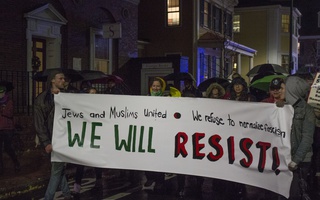When the Institute of Politics announced that Stephen K. Bannon would attend its customary two-day post-mortem of the presidential campaign, the backlash among members of the Harvard and Boston communities was swift. The former Breitbart News executive whom President-elect Donald J. Trump has appointed as his chief strategist is rightly considered to represent one of the most odious aspects of the Trump phenomenon: the enabling of prejudice for political gain. Though Bannon did not end up attending the event due to a scheduling change, students and citizens protested the IOP, many arguing that he should not have received an invitation at all—lest Harvard normalize Bannon and thus the hateful elements of Trump’s campaign.
There is validity to this concern. To accept Trump’s rhetoric wholesale would be to ignore the acts of hate it has inspired and the human consequences of his proposed policies on issues like immigration. Protesting and rejecting the worst impulses of the Trump campaign and administration will remain necessary over the course of the next four years.
As upsetting as it is, however, Trump’s victory is a reality that demands understanding. Though Bannon’s appointment dismays the millions of Americans his vision of our country excludes, in all likelihood, he will remain at the center of power for years to come. Ultimately, Harvard and the IOP have a responsibility to ensure that both this community and the wider public understand just what kind of political and ideological priorities people like Bannon will bring with them to the White House.
We do not make this claim lightly. Extending Bannon an invitation to the IOP undoubtedly lends a certain imprimatur of legitimacy to his views. Nevertheless, even worse would be the implicit normalization of ignoring them. Harvard as an institution has the privilege and the duty to educate its students and the public about the world, including its less savory aspects.
Perhaps worse than ignorance is the reliance on stigma. It is IOP tradition to invite the presidential campaign managers after the electoral campaign, and breaking tradition would have sent shockwaves over a mere discussion of the election. It would be wiser for Bannon’s opponents to save such a powerful move for specific policies instead of general disapproval of rhetoric for two reasons. First, to play one’s strongest card over a relatively minor event would reduce its effectiveness if and when something worse occurs. Second, disinviting Bannon and Trump over more abstract accusations of prejudice risks making them appealing as enemies of political correctness and mainstream institutions. While their appeal to these sentiments is distasteful and only effective to a certain extent, the polarization of the country demands a degree of conciliation that is not compatible with a blanket refusal to engage the other side.
That we are having these discussions in 2016 is, at the very least, unfortunate. It should go without saying that white supremacy is a morally bankrupt ideology totally divorced from reality and the founding principles of our country, and that those who offer it aid and comfort have no place in a government of, by, and for all of the people. But in our current political climate, part of Harvard’s educational mission is to help its students understand the views of people like Stephen Bannon. We all have a responsibility to fight the hatred and fear that are central to the President-elect’s rhetoric, and part of that responsibility entails understanding precisely what we are fighting.Read more in Opinion
Why I Cannot Vote Yes or No on the Lewis MotionRecommended Articles
-
A Country Ill At EaseNow that he has been elected president, however, Trump must work to bring the many groups his campaign has derided and insulted into his vision of a strong, united country, while facing the consequences of his unacceptable and demeaning rhetoric.
-
 Bannon, Conway Among 2016 Political Advisers to Convene at IOP
Bannon, Conway Among 2016 Political Advisers to Convene at IOP -
Harvard Affiliates, Boston Residents to Protest Bannon's VisitHarvard affiliates and residents from across the Boston area are organizing efforts to protest top Donald Trump adviser Stephen K. Bannon’s visit to the Institute of Politics this week.
-
 Protesters Denounce Trump Advisers Outside IOP Event
Protesters Denounce Trump Advisers Outside IOP Event -
China as PhantomThe connection between China and the American right has never been more public. China grows as the United States halts, representing both threat and opportunity for escapism.













